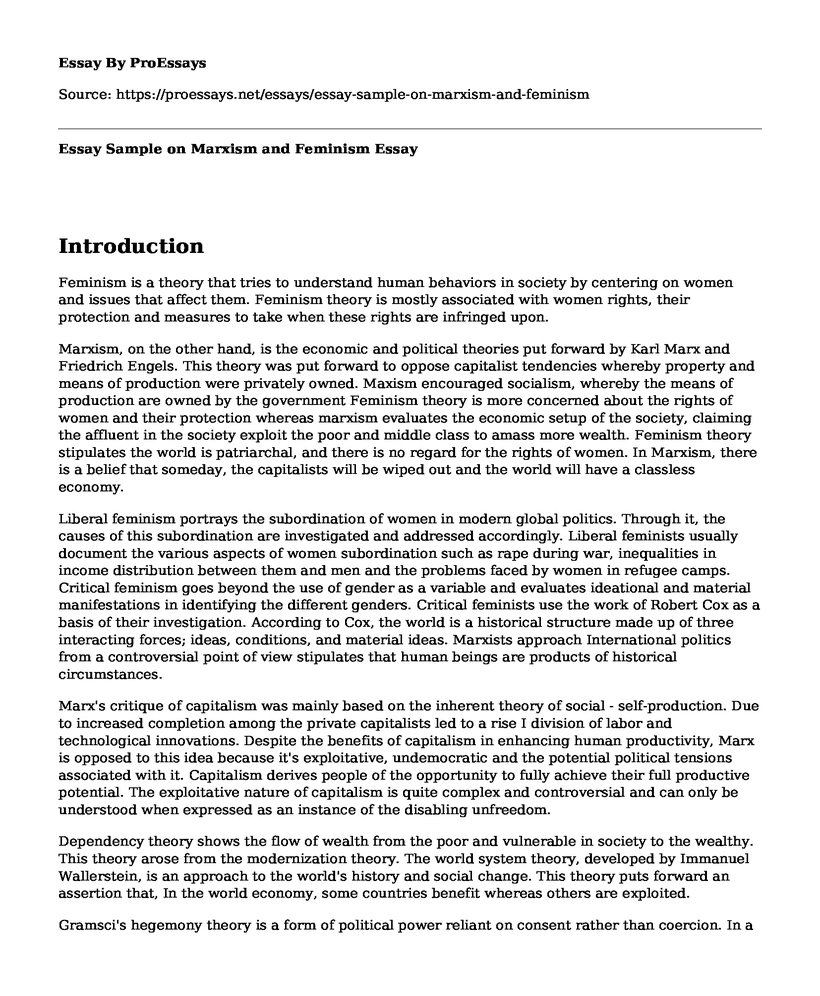Introduction
Feminism is a theory that tries to understand human behaviors in society by centering on women and issues that affect them. Feminism theory is mostly associated with women rights, their protection and measures to take when these rights are infringed upon.
Marxism, on the other hand, is the economic and political theories put forward by Karl Marx and Friedrich Engels. This theory was put forward to oppose capitalist tendencies whereby property and means of production were privately owned. Maxism encouraged socialism, whereby the means of production are owned by the government Feminism theory is more concerned about the rights of women and their protection whereas marxism evaluates the economic setup of the society, claiming the affluent in the society exploit the poor and middle class to amass more wealth. Feminism theory stipulates the world is patriarchal, and there is no regard for the rights of women. In Marxism, there is a belief that someday, the capitalists will be wiped out and the world will have a classless economy.
Liberal feminism portrays the subordination of women in modern global politics. Through it, the causes of this subordination are investigated and addressed accordingly. Liberal feminists usually document the various aspects of women subordination such as rape during war, inequalities in income distribution between them and men and the problems faced by women in refugee camps. Critical feminism goes beyond the use of gender as a variable and evaluates ideational and material manifestations in identifying the different genders. Critical feminists use the work of Robert Cox as a basis of their investigation. According to Cox, the world is a historical structure made up of three interacting forces; ideas, conditions, and material ideas. Marxists approach International politics from a controversial point of view stipulates that human beings are products of historical circumstances.
Marx's critique of capitalism was mainly based on the inherent theory of social - self-production. Due to increased completion among the private capitalists led to a rise I division of labor and technological innovations. Despite the benefits of capitalism in enhancing human productivity, Marx is opposed to this idea because it's exploitative, undemocratic and the potential political tensions associated with it. Capitalism derives people of the opportunity to fully achieve their full productive potential. The exploitative nature of capitalism is quite complex and controversial and can only be understood when expressed as an instance of the disabling unfreedom.
Dependency theory shows the flow of wealth from the poor and vulnerable in society to the wealthy. This theory arose from the modernization theory. The world system theory, developed by Immanuel Wallerstein, is an approach to the world's history and social change. This theory puts forward an assertion that, In the world economy, some countries benefit whereas others are exploited.
Gramsci's hegemony theory is a form of political power reliant on consent rather than coercion. In a hemogenic social setup, the dominant groups in the society come up with a vision intended to serve the interests of everyone, and the use some incentives to bring junior partners on board and to divide and dismantle the opposing groups .For example, global media companies such as Times New York, Time Warner may be used to spread hegemony.
Cite this page
Essay Sample on Marxism and Feminism . (2022, Oct 16). Retrieved from https://proessays.net/essays/essay-sample-on-marxism-and-feminism
If you are the original author of this essay and no longer wish to have it published on the ProEssays website, please click below to request its removal:
- A Review of Who Freed The Slaves? The Fight Over the Thirteenth Amendment
- Presidential Power Essay
- Investigating Sex Crimes Paper Example
- Essay Sample on Corporate Policies
- Essay Example on Comorbidity of Alcoholism & Gambling: A Dangerous Combination
- Essay on Border Security: An In-Depth Analysis of U.S. Immigration Issues
- Paper Example on Living in Between: Lahiri's Struggle to Balance Indian & American Identities







